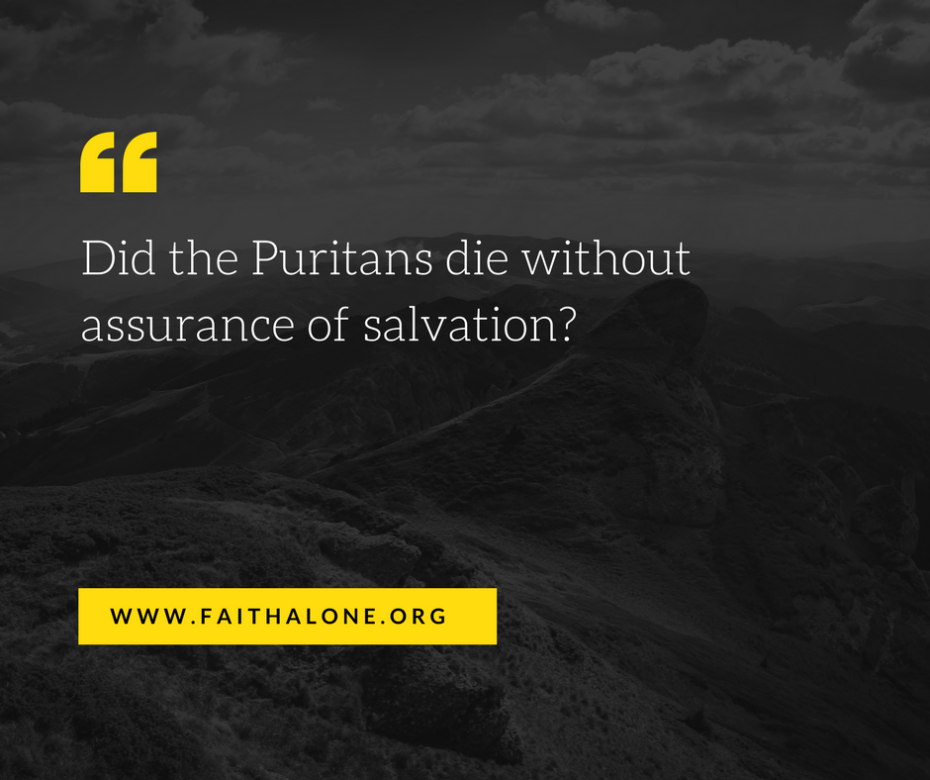I received this question by email from RH in Florida:
In your August 15, 2017 blog article, “Anybody Can Be a Christian for Five Hours or for Five Years,” you wrote:
“Dr. R. T. Kendall in his book Calvin and English Calvinism to 1649 reports that nearly to a man the great Puritan theologians lamented on their death beds that they probably were going to hell because they did not see enough evidence in their works to convince them that they had fought the good fight, finished the race, and kept the faith.”
Could you supply the page number or numbers where Kendall says this?
I could not find the precise quote. On page 75 of Kendall’s book, Calvin and English Calvinism, he indicates that when William Perkins died—like most Puritans, he was troubled about where he would go:
Thomas Fuller says that Perkins reportedly died “in the conflict of a troubled conscience.” This is “no wonder,” for God “seemingly leaves his saints when they leave the world, plunging them on their death-beds in deep temptations, and casting their souls, down to hell, to rebound to higher heaven.”
I also found a Puritan website where a blogger, Ron Henzel, saw my blog and wrote a response blog of his own. He posted a video featuring a short clip by Dr. R. C. Sproul and then another short video by me. (Interestingly, the video is by a church I’m not familiar with.) Henzel questioned my claim that Kendall had said that nearly to a man the Puritan divines died in despair that they might not be regenerate. He said that he had several email exchanges with Kendall in which he agreed that he did write that, but that Kendall could not find the actual quote either. Kendall thinks it may have been cut because when his dissertation was converted to a book, some was cut. (Henzel also says that he reached out to me and that I did not respond. I do not recall the contact.) Here is Henzel’s article.
Did the Puritans die without assurance of salvation? Note the quote by Ed Walsh in the 14th comment which follows Henzel’s article:
Here’s an excerpt from The Puritan Way of Death where the author seems to agree, although he only presents one supporting story in some detail. He relates the doubts of Increase Mather as told by his son Cotton.
…Or, as Allan I. Ludwig has more recently-and somewhat more dramatically-put it: “In the midst of darkness and confusion there was light, the triumph of Death was overcome by eternity. The fear of death gave way to the thrill of spiritual pleasures yet to come as archangels trumpeted the glorious day.” The evidence does not confirm this interpretation. Instead, it suggests that the Puritans were gripped individually and collectively by an intense and unremitting fear of death, while simultaneously clinging to the traditional Christian rhetoric of viewing death as a release and relief for the earth-bound soul.
—David E. Stannard. The Puritan Way of Death: A Study in Religion, Culture, and Social Change. Kindle Edition. Kindle Locations 814-816.
Kendall and I are not the only ones to notice the Puritan fear of death and lack of assurance.
In doing this research, I also came across multiple references to my debate on regeneration, perseverance, faith, and assurance in 2005 with Dr. James White. You can watch it here. It is over two hours long, so you might want to skim. But at the 1 hour and 42-minute mark, you will note that I mention Kendall’s claim that the Puritan divines, nearly to a man, died in despair. If you only have a few minutes, I suggest you check out the closing remarks, 5 minutes long each, by Dr. White and by me (from 2:16 to 2:25:43).
Sorry I couldn’t find the precise Kendall quote. But I’m glad to find this blog by Henzel, the comment by Walsh, and the book by Stannard.


